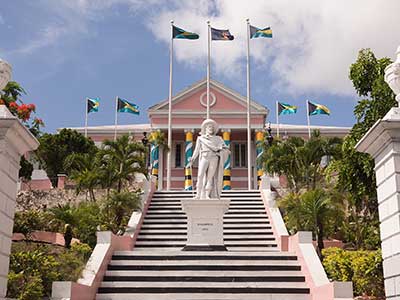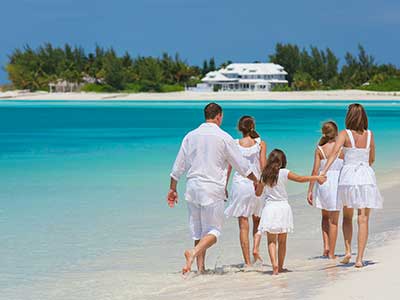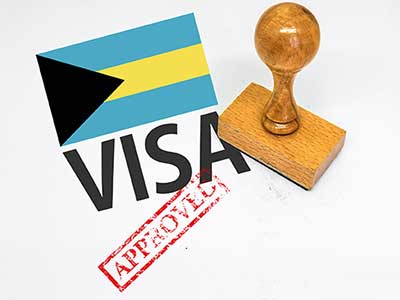Residence in the Bahamas
Although known to most people as a great holiday destination, the Bahamas is a serious option as a country of residence for wealthy families and retirees. With its attractive geographical position just off the coast of Florida, its tax system and great tropical climate, the Bahamas has long been a favourite destination for wealthy families to relocate to.
Read further or contact us now for more information.
History of the Bahamas
Christopher Columbus discovered the Bahamas in 1492. The Commonwealth of the Bahamas (as the country is now officially named) was originally inhabited by the Lucayan people.
Instead of colonising the Bahamas, the Spanish captured most of the Lucayan people and put them to work as slaves in Hispaniola, leaving the islands almost deserted. Around 1650 the first English arrived on the Bahamian Islands, and it became a British colony in 1718.
In 1973 the Bahamas became a sovereign state (Commonwealth realm) with Queen Elizabeth II as its monarch. On the over 700 islands of the archipelago, there are now a total of approximately 325,000 residents. Only a few of the islands are actually inhabited. Approximately two-thirds of the Bahamian population lives on the island of New Providence. New Providence is also home to the capital of the Bahamas, Nassau.
The Bahamas’ government & economy

The Bahamas is a parliamentary constitutional monarchy and its parliament consists of two Chambers – the House of Assembly, comprising 38 members, and the Senate, which has 16 members. The leading party provides the Prime Minister, who in turn forms a Cabinet, the executive power. As in all other jurisdictions of the Commonwealth, the Queen is represented by a local Governor-General, whose term of office is usually five years.
Due to its history and location the Bahamas is strongly connected to both the United Kingdom and the United States. The main language spoken is English. The official currency of the Bahamas is the Bahamian dollar, which is pegged to the US dollar one to one.
Tourism and financial services
Tourism is the central economic pillar of the Bahamas. The islands are among the favourite holiday destinations of Americans and the Bahamian ports are frequently visited by cruise ships.
The financial service industry is the second leading economic activity of the Bahamas. All financial services provided out of the Bahamas are very much internationally focussed. There are not only quite a number of international (private) banks (including Swiss ones), but also a lot of insurance companies and trust providers, and the Bahamas even has its own stock exchange – the Bahamas International Securities Exchange.
Taxes in the Bahamas
- Personal income tax: Like native residents of the Bahamas, families who relocate to the Bahamas do not pay any personal income tax. This means that all types of personal income, such as salary and pensions, are tax exempt, as are all types of investment income.
- Wealth tax: The Bahamas does not levy a wealth tax either.
- Inheritance and gift tax: Inheritance and gift tax are not levied in the Bahamas.
- Stamp duty and VAT: The Bahamas only levies indirect taxes. These include a real-estate tax, value added tax (VAT), stamp duty, customs duty and excise duty. The applicable VAT rate is 12%. Stamp duty is levied on certain transactions or court formalities. Customs duty is payable on any goods imported into the Bahamas.
- Exit tax: The Bahamas does not levy an exit tax on wealth or (non-realised) gains when you leave the Bahamas and relocate to another jurisdiction.
Source: The International Bureau of Fiscal Documentation. Last updated: September 2019.
Special tax treatment of foreigners relocating to the Bahamas
There is no special tax regime applicable in the Bahamas for people who have moved there.
Benefits of living in the Bahamas

They are in close proximity to the United States, the flight time between Miami and Nassau (New Providence) being under one hour, and ferries being able to ship you to the United States within a few hours. Most of the other main islands also have good flight connections to the United States and direct flights to a considerable number of South American and European destinations.
An increasing number of wealthy families are interested in living in the Bahamas, not only for its climate and tax environment, but also because it allows them to establish their business there. As the islands do not levy corporate income tax, business owners generate profits completely exempt of tax.
Health, education and real estate
The quality of the health system and security for residents and their belongings does depend on which island you reside on. The health care system is generally good, with public hospitals and private clinics present, but you can imagine that this is only the case for the most densely populated islands. The more sparsely populated an island you select, the more privacy you will enjoy, but the more dependent you will be on your own resources.
The educational system in the Bahamas is still very much based on the British system. As well as the public primary and secondary schools, which can even be found on the more remote and less populated islands, there is a small number of international schools on the most populated islands. The Bahamas has one college, which is in Nassau.
Real estate prices in the Bahamas considerably decreased during the 2008 financial crisis, and for several years thereafter, but have been recovering since then. Real estate on the islands can be found in any price range, from a few hundred thousand dollars to tens of millions. What makes the Bahamas quite unique compared to other jurisdictions to which you can relocate, is the fact that it offers you the possibility of buying not only a house or an apartment, but even your own private island.
Visas and residency permits

❝ An increasing number of wealthy families move to the Bahamas ❞
What should not be forgotten is that a lot of the flight connections to the Bahamas go via the United States, so travellers should also make sure they fulfil the travel, passport and visa conditions for the US.
If you want to stay longer than two months in the Bahamas, you will have to obtain a residence permit from the immigration authorities in the Bahamas.
Becoming a resident of the Bahamas
There are various ways to obtain residency in the Bahamas. One can apply for a home owner’s card, an annual residency permit, or a permanent residency permit. For the purposes of this document we will focus on the permanent residency permit (Economic Permanent Residency [EPR]).

- The accelerated permanent residency procedure, which is for applicants:
- purchasing a property which is worth at least USD 1.5 million,
or - making a substantial investment in the Bahamas of at least USD 1.5 million, which supports additional employment of Bahamians.
- purchasing a property which is worth at least USD 1.5 million,
- The standard procedure, which is for applicants:
- acquiring real estate with a minimum value of USD 750,000,
or - making an investment in the Bahamas of at least USD 750,000, which supports additional employment of Bahamians.
- acquiring real estate with a minimum value of USD 750,000,
The only actual difference between the two procedures is the time the government takes to respond to your application. In the case of the accelerated procedure the decision on the request for residency should be taken within three weeks of filing the request. The standard procedure takes a bit longer.
The application procedure for a permanent residency permit in the Bahamas is fairly simple, but it is recommended that you use a local private bank and/or legal advisor to assist you with the process.
 The conditions applicants must fulfil are (in detail):
The conditions applicants must fulfil are (in detail):
- Be of legal age (>18),
- Declare that they intend to reside permanently in the Bahamas,
- Acquire a property or make a substantial investment in the Bahamas,
- Provide (at least) the following administrative documents:
- A copy of a valid passport;
- An original certified birth certificate. If the original document is not in English, a certified English translation must be provided as well. The translation must be sealed by the Consular Office, with a BS$ 10 Bahamian postage stamp attached to it. The birth certificate of the wife/husband must also be provided in the same manner;
- A marriage certificate, divorce certificate or death certificate of the spouse, as applicable;
- An up-to-date and original police certificate / certificate of good conduct (criminal record check) issued by the authorities of the original home jurisdiction. The document(s) should cover five years;
- An original medical certificate (recent); please also note in this respect that the Bahamas does not have obligatory health insurance;
- Original character references in writing by two persons who have known the applicant for at least 5 years;
- Financial references (e.g. issued by a (local) private bank) substantiating economic worth, property owned and indicating a figure range;
- Two up-to-date (passport) photographs of the applicant, with their full name written on the back;
- The official application form must be completed and filed in duplicate (it is obligatory to have it notarised by a lawyer or Justice of the Peace);
- A BS$ 4.00 Bahamian postage stamp;
- A processing fee of BS$ 100 must be paid (non-refundable).
- When the Department of Immigration of the Bahamas approves the application, a BS$ 10,000 fee will need to be paid.
The full application for residency and supporting documents are to be filed with the Department of Immigration of the Bahamas. Contrary to the home owner’s card and an annual residency permit, the permanent residency permit is, when issued to you, valid for life (unless revoked).
As the conditions for applying for an annual residency permit are very similar to those for obtaining a permanent residency permit, with the difference that purchasing a property or making an investment is not necessary, one could also consider starting the process by just renting a property and applying for the annual permit first.
It is also possible to obtain a work permit in the Bahamas. That option is outside the scope of this article.
Source: The government of the Bahamas – Department of Immigration
Citizenship in the Bahamas
Obtaining citizenship of the Bahamas as a foreigner is not easy. There is no special citizenship program (such as an investor visa program), unlike in some other jurisdictions. Citizenship can be applied for by individuals who:
- have been a legal permanent resident of the Bahamas for at least ten years in total,
and - have resided there for at least the last seven years before the date the application is filed.
The request for citizenship, including supporting documents, should be filed with the Bahamian Department of Immigration, which processes the application independently.
Leaving your home country and moving to the Bahamas

The jurisdiction which you intended to leave might not take your departure into account if you are not actually spending more than six months per year in the Bahamas. There are also jurisdictions that consider the Bahamas a ‘tax haven’ and therefore completely ignore the fact that you have moved to the Bahamas. In that case your original home country could still consider you a fully taxable resident or demand additional proof of the fact that you are living in the Bahamas.
So, although living in the Bahamas and the relocation process looks easy, you might have to combine it with careful and complicated planning in your original home jurisdiction (exit planning). Because of this, in some cases the Bahamas is not a suitable jurisdiction at all. In any case leaving your original home jurisdiction for good is always the most important step in a relocation process.


 The conditions applicants must fulfil are (in detail):
The conditions applicants must fulfil are (in detail):
